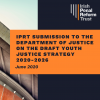Youth Justice
Ireland has a long history of poor responses to offending behaviour by children. A core strand to IPRT's work since its establishment in 1994 has been the promotion of a more effective youth justice system, with emphasis on non-custodial alternatives, diversion, early intervention and prevention strategies and programmes. Central to our work was ending the practice of detaining children in adult prisons, which was in breach of international human rights standards and a serious stain on Ireland's human rights record.
International human rights standards, and in particular the provisions of the UN Convention on the Rights of the Child, are clear that custody for children should only be used as a last resort and for the minimum required period of time. All efforts should be made to apply alternatives to detention to ensure that such a measure is only used in exceptional circumstances.
In Ireland, the Children Act 2001 recognizes the principle of detention as a last resort. The Act prohibits the imprisonment of children and the Criminal Justice Act 2006 makes provision for all children less than 18 years of age to be detained in Children Detention Schools. The detention school model is focused on a model of care, education, health and programmes that address offending, with improved outcomes for the young people, their communities and all of society. The Irish Youth Justice Service is responsible for the Children Detention Schools, within the Department of Children and Youth Affairs.
Following years of sustained advocacy by IPRT, along with many national and international bodies, in 2012 the detention of boys aged under 17 at St Patrick's Institution ended. In March 2017, a Ministerial Order ended the sentencing of children aged under 18 to adult prison in Ireland, and in April 2017, St. Patrick’s Institution was finally closed. Since September 2017 boys aged under 18 are no longer detained in the adult prison system.
IPRT continues to work towards progressive change in youth justice policies and practice, as well as engaging with wider policy and practice issues relating to youth justice, such as the provision of alternatives to detention, diversion and early intervention programmes.


Research reports from the Greentown Project launched by Minister for Justice
27th January 2021
The Minister also announced the commencement of a newly designed community intervention programme based on this University of Limerick research.
UK: Disparities in youth diversion – an evidence review
27th January 2021
This literature review by the Centre for Justice Innovation explores how youth diversion can contribute to keeping children and young people out of the formal criminal justice system but, if access to diversion is unequal, it can exacerbate racial inequality in criminal justice outcomes for young people.
UK: Ethnic disproportionality in remand and sentencing in the youth justice system
22nd January 2021
This large-scale study finds that Black, Asian and other Minority Ethnic children are less likely to get a formal out-of-court disposal than other children, among other findings
Youth (in)justice and the COVID-19 pandemic: rethinking incarceration through a public health lens
18th January 2021
This paper, published by Taylor & Francis Online , focuses on findings from a larger study involving interviews with policy-makers, practitioners and researchers working in youth justice, focusing...
Children Held on Remand in Victoria: A Report on Sentencing Outcomes
2nd October 2020
This report by the Sentencing Advisory Council (Australia) considers the relationship between remand and sentencing, and identifies the proportion of remanded children who did not go on to receive a custodial sentence for their offending.
Review and Evaluation of Garda Youth Diversion Programmes 2019
25th September 2020
Reviews of 'Piot A and Pilot B', the 'Work to Learn Programme' and the QQI Co-ordinator Programme' have been published by the Department of Justice.
Why is diversion important for young people?
18th August 2020
Here, we summarise some of the processes involved in the Garda Youth Diversion Programme (GYDP), and outline the value of diversion from the full criminal justice system for young people.
Publication of Oberstown Annual Report 2019
23rd July 2020
The Annual Report 2019 highlights the characteristis of the young people in Oberstown care in 2019, reports a marked shift away from the use of restrictive regimes, and details the programmes which continue to have a positive impact on children and young people.

IPRT Submission to the Department of Justice on the Draft Youth Justice Strategy 2020-2026
30th June 2020
Adopting an evidence-informed approach, IPRT outlines four key areas of youth justice that should be reinforced or inserted into the Draft Youth Justice Strategy.

‘Our Shared Future’ – Draft Programme for Government 2020+
15th June 2020
IPRT strongly welcomes many of the proposals in the draft Programme for Government. In particular, we welcome that the document reflects all of the five recommendations IPRT campaigned on in advance of the 2020 General Election.




